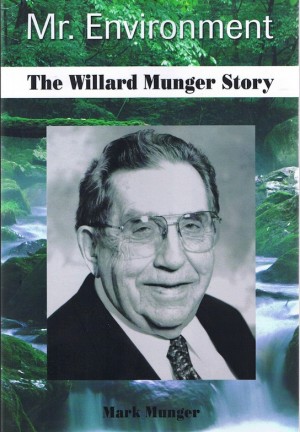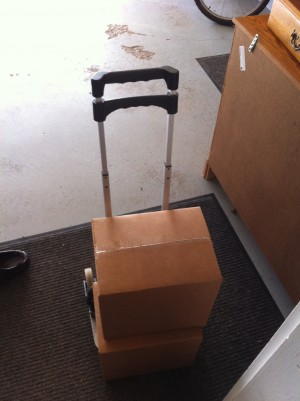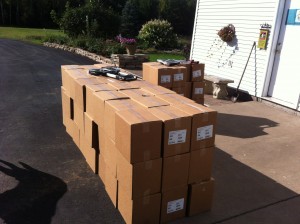I’m not a businessman. I am a husband, father, grandfather, judge, outsdoorsman and, during my “spare” time, a pretty fair writer. But as the owner of a small press, I am as clueless as a Bedouin on skis when it comes to commerce. My blind spot when it comes to my art is that I am an optimist. With every new book released over the past thirteen years (9 in all),I have supreme confidence that each newly published title will be “the” book, the one the takes off, sells well, and solidifies me as a regional author. The sad reality is that isn’t what’s happened. I’ve been led by my cheery optimistic nature down a primrose path to cliffs overlooking a vast sea of self-published, remaindered books. My books. There is no better example of my lack of business acumen than the book that took the most blood, sweat, and tears of any of my projects: Mr. Environment: The Willard Munger Story.
Conceived after my uncle, Minnesota’s sentinel environmental lawmaker, passed away in 1999, as a loving tribute to a man who was both my personal mentor and an inspiration to thousands of Minnesotans, Mr. Environment took five years to research, write, edit, and publish. It had the longest gestation period of any of my books. When the manuscript was finally printed in March of 2009, my buddy Eddie and I drove my Pacifica to pick up 2,000 copies of the biography from Bang Printing in Brainerd. We stood and watched cartons of my family’s legacy being loaded by forklift onto the bed of a rental truck, amazed at how much room 2,000 copies occupied. And then, it was on to Duluth to store the cartons in a rented storage building. I had no room for 2,000 books at my house and expected that the sales of the book would justify the monthly rent for commercial storage. But I was wrong about that too.
The book went on public display during a Duluth Symphony Orchestra concert where the DSO honored my uncle with selections from Sibelius and former Vice President Mondale spoke with and answered questions from the crowd about Willard’s life and legacy. Only two dozen copies were sold at the concert. I had anticipated, given the publicity the event generated in the local media, and glowing early reviews, selling at least fifty. Here’s a sample of the reviews that raised my hopes as to the commercial success of the book:
This weekend, I picked up a copy of the new Munger biography, Mr. Environment…and was pleased to find on its’ pages the Munger I’d hoped to hear one last time. (A)uthor Mark Munger has done a stellar job detailing the life of a legislator who was a pioneer in turning state policy into a force for environmental protection.
Minneapolis Star Tribune
With accolades like that popping up throughout the state, why wouldn’t an author be optimistic? Unfortunately, after the meager success at the DSO event, I came to realize my early visions of books flying off the table was unlikely.
The actual launch of the book took place at the Labor Temple in Duluth. There was a great crowd of my readers, family, and local Liberals and environmentalists on hand to listen to music by Sara Thomsen, hear me read from the biography, mingle, and buy books. Again, sales failed to meet expectations. Undaunted by these early signs of fiscal disaster, I soldiered on, lugging cartons of Mr. Environment and my other books to outdoor art and craft shows, environmental expos, and assorted other venues across Minnesota and Wisconsin. Sadly, the enthusiasm among the onservationists, and environmentalists who had, over the years after Willard’s death, urged me to write his story, didn’t acknowledge their urgings with book purchases. Letters and emails to the major environmental and conservation groups in Minnesota offering to attend meetings, talk about Willard, and sell copies of the biography fell on deaf ears. The lone exception to this silence was an invitation from the Duluth chapter of the Izaak Walton League. Other than one night standing in front of an appreciative crowd of Ikes at the Hartley Nature Center in Duluth, no other conservation group invited me to speak. Additionally, around the time the book was launched, the full impact of the recession arrived and venues, like the Apple Festival in Bayfield and the Festival of the Trees in Duluth dried up as sources for book sales. Also, Americans more and more began to buy their written content, both fiction and nonfiction, on eReaders, avoiding the impulse to buy regional books at art and craft events in favor of online purchasing.
In response, I did what any good capitalist would do: I slashed the price of the book. I had originally priced Mr. Environment at $25.00 per copy, a price in line with other books of its size, depth, and genre. I also enlisted my youngest son Jack to help me move the books from the storage building to an empty bedroom in the basement of our home. Chris, our third son, had moved out, freeing up space to store the books without incurring monthly rent. It took Jack and I the better part of a Saturday to load 1,600 copies of the biography into my Pacifica and our utility trailer and haul the books home. With the price reduced to $15.00, then to $10.00, and then finally, to $5.00 per copy, I again sent out information to all of the leading environmental and conservation groups in Minnesota. I also queried the entire DFL legislative caucus in both the Minnesota House and Senate. I sold less than a dozen copies to Liberal legislators and did not hear back from a single environmental/conservation group. Not a one. There was, despite all the prodding I’d received to write the book from conservation-type folks over the years, zero interest from them in actually buying the book. To say I was disappointed is putting it mildly.
Last spring, my father, Willard’s youngest brother and the only surviving Munger sibling, called me at work with an idea.
“What if you donated copies of the book to UMD? Willard loved the school, fought hard for its funding and improvement, and surely someone there would be interested in receiving copies of the biography to be given away to students?”
It’s been years since I took tax law in law school. But I still recall that it’s better to have income when you seek to take a charitable deduction and, given the utter lack of buyers for the book in the public marketplace of ideas, well, I wasn’t sold that donating the books was viable. But I talked to my accountant and he assured me it was a feasible plan. And so, I went to work convincing not only the University of Minnesota-Duluth (UMD), my alma mater, but also the University of Wisconsin-Superior (UWS) (where I teach Environmental Law and use the book as an optional text) to accept books as a donation. It took four months of arranging and wrangling but yesterday, with the help of my sons Matt, Chris, and Jack, UMD received 1,000 copies of the book and UWS received 250 to be distributed to students and faculty interested in the life and legacy of Minnesota’s Mr. Environment.
My sons endured a bit of hand wringing and nervous twitching from me yesterday after I’d dragged 90 cartons of books from the basement into the bright autumnal sunshine. Matt rented a Uhaul trailer (providential, eh?) for the move and was supposed to be at the house by 9:00am. My wife Rene’ and I had folks coming for brunch to celebrate my mom’s 85th and Jack’s 16th birthdays at 10:00am, so Matt’s timely arrival was important to the schedule. Matt was late and my timetable fell apart but it all worked out. Even Dylan, my second son, in from the oil fields of North Dakota, stepped up and helped load the trailer. Though it was long past noon when Matt, Chris, Jack, and I finally hit the road, we made it to the colleges and unloaded the books.
There’s an old saying, and I’m paraphrasing here, about it being better to have tried and failed than never having tried at all. But I’m not so sure, after five years of writing my uncle’s story and four years of being unable to effectively market it, that I’m comforted by that sentiment. though I am happy that students at two public universities in the place Willard Munger called home will have the chance to learn that one man, of modest means and a limited education, can make a difference. In the end, maybe that’s more important than selling books.
I do know this: I will never again write a book simply because it’s pitched to me as a good idea. From now on, I’ll write only what my heart tells me to write. It seems I don’t have much of a head for the business end of things so I think it’s best that I keep my goals for my stories modest. I’ll be far better off following my muse and ignoring suggestions advanced by well meaning strangers.
Peace.
Mark
Mark





